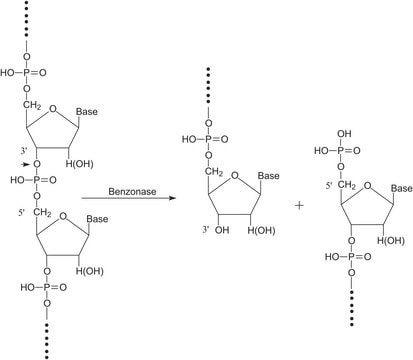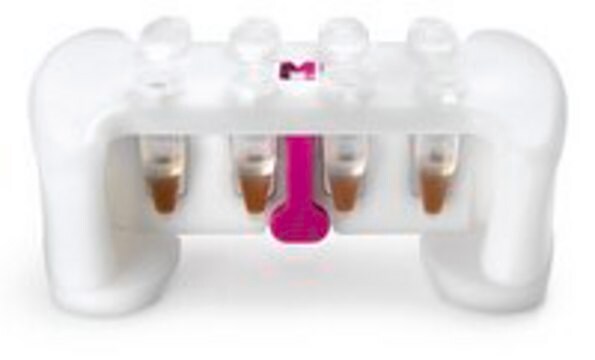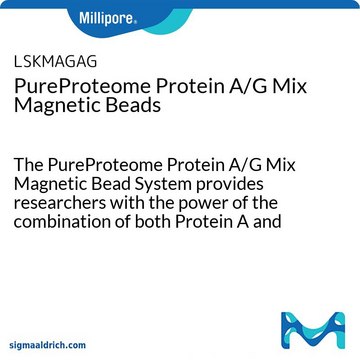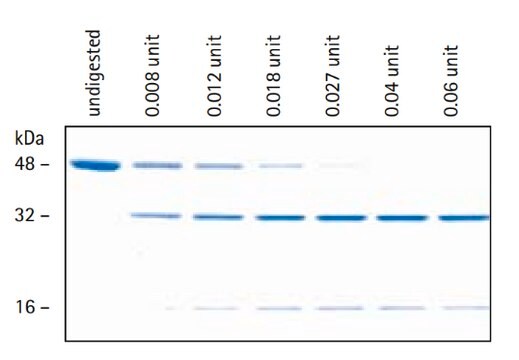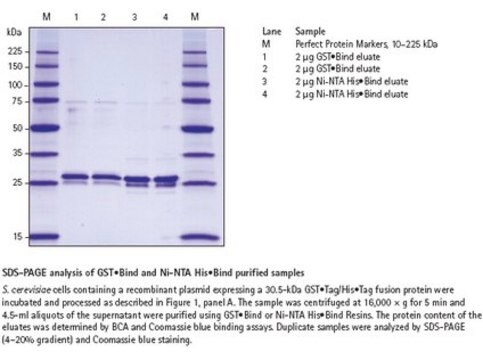11719394001
Roche
Immunoprecipitation Kit (Protein A)
sufficient for 20 reactions, kit of 1, suitable for immunoprecipitation (IP)
Sign Into View Organizational & Contract Pricing
All Photos(1)
About This Item
UNSPSC Code:
12352200
Recommended Products
usage
sufficient for 20 reactions
packaging
kit of 1
manufacturer/tradename
Roche
technique(s)
immunoprecipitation (IP): suitable
storage temp.
2-8°C
General description
Immunoprecipitation is a widely used method for the analysis of target antigens in complex mixture of proteins. The protein of interest can be concentrated and immunoaffinity -purified in one step on an analytical scale via a specific antibody. Often, immunoprecipitated proteins are functionally fully active and can be further analyzed with respect to enzymatic activity, interactions, modifications and structure.
Kit contains all reagents necessary for cell lysis, solubilization, stabilization, and immunopurification of proteins.
Application
Immunoprecipitation Kit (Protein A) has been used for the immunoprecipitation of proteins from cellular extracts with Protein A Agarose.
Packaging
1 kit containing 5 components.
Preparation Note
Working solution: Lysis buffer/wash buffer 1
The kit contains reagents for 125 ml of lysis buffer/wash buffer 1. Prepare at least a minimal volume of 25 ml, sufficient for four immunoprecipitations.
To prepare 25 ml of lysis buffer/wash buffer 1 mix 5 ml core buffer, 3.75 ml NaCl, 2.5 ml detergent mix and 1 cOmplete tablet. Add water to a final volume of 25 ml.
Solution is stable at 2 to 8 °C for 24 hours. When stored in aliquots at -15 to -25 °C, the solution is stable for at least four weeks. Mix thoroughly after thawing.
Wash buffer 2
The kit contains reagents for 50 ml of wash buffer 2. 2 ml of this buffer is required for one immunoprecipitation.
To prepare 50 ml of wash buffer 2 mix 10 ml core buffer, 25 ml NaCl and 0.5 ml detergent mix. Add water to a final volume of 50 ml.
Solution is stable at 2 to 8 °C. For longer periods, store aliquots at -15 to -25 °C. Mix thoroughly after thawing.
Wash buffer 3
The kit contains reagents for 25 ml of wash buffer 3. 1 ml of this buffer is required for one immunoprecipitation.
To prepare 25 ml mix 1 ml core buffer and 0.25 ml detergent mix. Add water to a final volume of 25 ml.
Solution is stable at 2 to 8 °C. For longer periods, store aliquots at -15 to -25 °C. Mix thoroughly after thawing.
The kit contains reagents for 125 ml of lysis buffer/wash buffer 1. Prepare at least a minimal volume of 25 ml, sufficient for four immunoprecipitations.
To prepare 25 ml of lysis buffer/wash buffer 1 mix 5 ml core buffer, 3.75 ml NaCl, 2.5 ml detergent mix and 1 cOmplete tablet. Add water to a final volume of 25 ml.
Solution is stable at 2 to 8 °C for 24 hours. When stored in aliquots at -15 to -25 °C, the solution is stable for at least four weeks. Mix thoroughly after thawing.
Wash buffer 2
The kit contains reagents for 50 ml of wash buffer 2. 2 ml of this buffer is required for one immunoprecipitation.
To prepare 50 ml of wash buffer 2 mix 10 ml core buffer, 25 ml NaCl and 0.5 ml detergent mix. Add water to a final volume of 50 ml.
Solution is stable at 2 to 8 °C. For longer periods, store aliquots at -15 to -25 °C. Mix thoroughly after thawing.
Wash buffer 3
The kit contains reagents for 25 ml of wash buffer 3. 1 ml of this buffer is required for one immunoprecipitation.
To prepare 25 ml mix 1 ml core buffer and 0.25 ml detergent mix. Add water to a final volume of 25 ml.
Solution is stable at 2 to 8 °C. For longer periods, store aliquots at -15 to -25 °C. Mix thoroughly after thawing.
Other Notes
For life science research only. Not for use in diagnostic procedures.
Kit Components Only
Product No.
Description
- Core Buffer
- NaCl
- Detergent Mix
- cOmplete Protease Inhibitor Cocktail Tablets (5)
- Protein A Agarose ready-to-use
Signal Word
Danger
Hazard Statements
Precautionary Statements
Hazard Classifications
Aquatic Chronic 2 - Eye Dam. 1 - Skin Corr. 1B - Skin Sens. 1
Storage Class Code
8B - Non-combustible corrosive hazardous materials
WGK
WGK 3
Flash Point(F)
does not flash
Flash Point(C)
does not flash
Certificates of Analysis (COA)
Search for Certificates of Analysis (COA) by entering the products Lot/Batch Number. Lot and Batch Numbers can be found on a product’s label following the words ‘Lot’ or ‘Batch’.
Already Own This Product?
Find documentation for the products that you have recently purchased in the Document Library.
Customers Also Viewed
Wilfried Posch et al.
mBio, 12(5), e0240821-e0240821 (2021-10-13)
Complement-opsonized HIV-1 triggers efficient antiviral type I interferon (IFN) responses in dendritic cells (DCs), which play an important role in protective responses at the earliest stages in retroviral infection. In contrast, HIV-1 suppresses or escapes sensing by STING- and MAVS-associated
Foquan Luo et al.
Molecular neurobiology, 57(9), 3702-3711 (2020-06-22)
Postoperative cognitive dysfunction (POCD) affects millions of patients each year in the USA and has been recognized as a significant complication after surgery. Epigenetic regulation of learning and memory has been shown. For example, an increase of histone deacetylases (HDACs)
J A Arnott et al.
Bone, 42(5), 871-885 (2008-03-04)
Connective tissue growth factor (CTGF/CCN2) is a cysteine rich, extracellular matrix protein that acts as an anabolic growth factor to regulate osteoblast differentiation and function. In osteoblasts, CTGF is induced by TGF-beta1 where it acts as a downstream mediator of
Xiaoying Ying et al.
Hypertension (Dallas, Tex. : 1979), 68(5), 1160-1170 (2016-08-31)
Ubiquitin-specific protease 18 (USP18), a USP family member, is involved in antiviral activity and cancer inhibition. Although USP18 is expressed in heart, the role of USP18 in the heart and in cardiac diseases remains unknown. Here, we show that USP18
Yi Liu et al.
Cardiovascular research, 101(1), 87-96 (2013-11-29)
Toll-interacting protein (Tollip) is a critical regulator of the Toll-like receptor-mediated signalling pathway. However, the role of Tollip in chronic pressure overload-induced cardiac hypertrophy remains unclear. This study aimed to determine the functional significance of Tollip in the regulation of
Protocols
Immunoprecipitation Kit (Protein A) Protocol & Troubleshooting
Our team of scientists has experience in all areas of research including Life Science, Material Science, Chemical Synthesis, Chromatography, Analytical and many others.
Contact Technical Service



